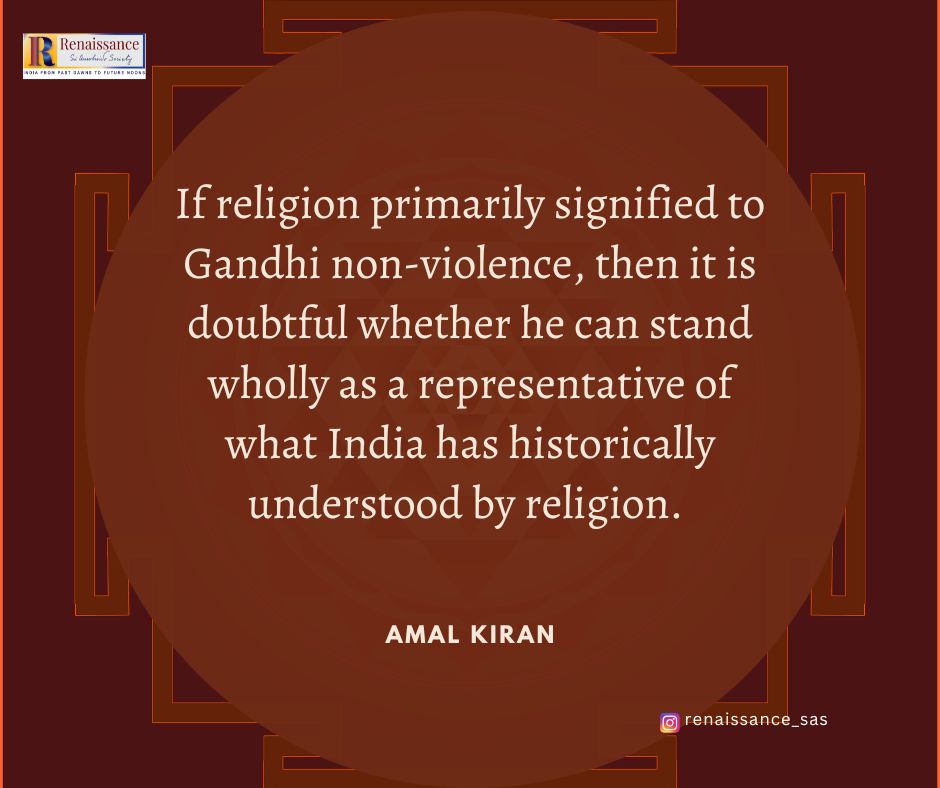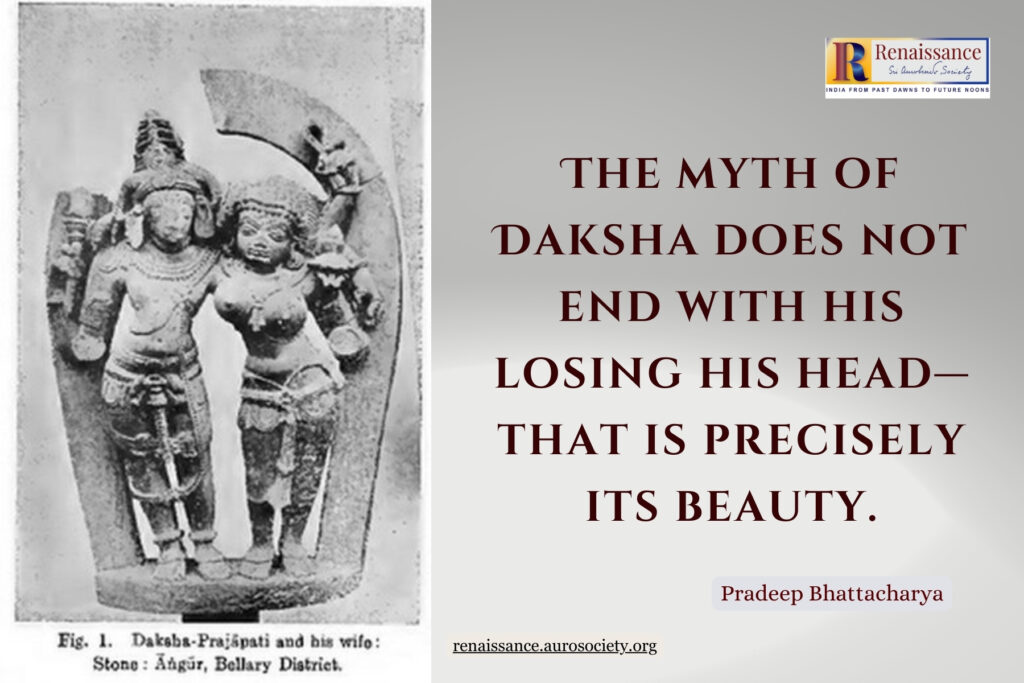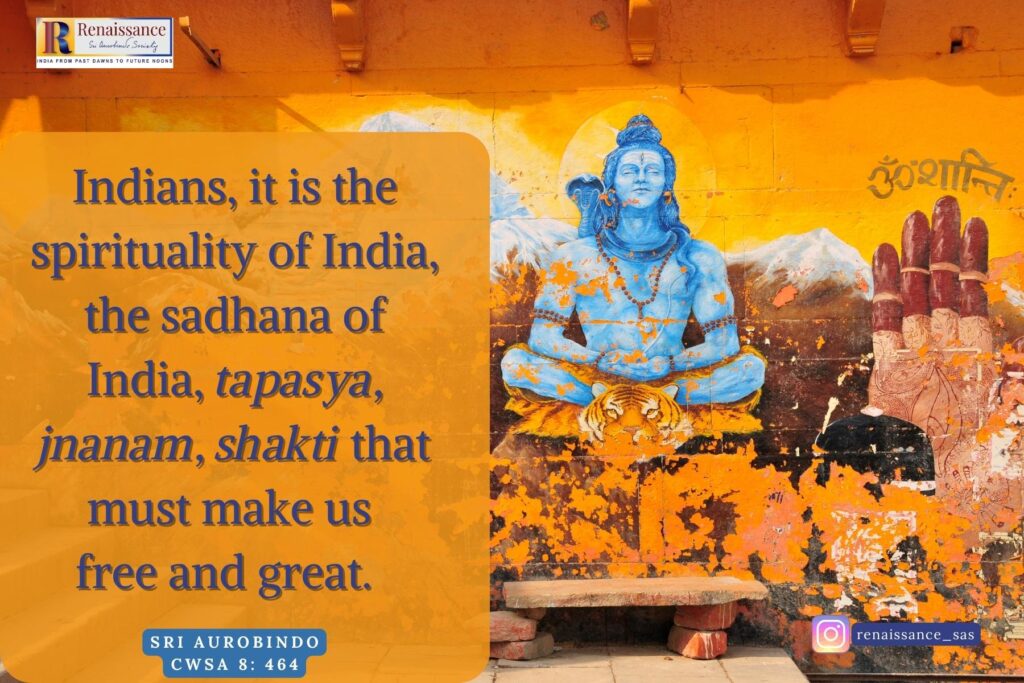PART 2
Continued from Part 1

Did Gandhi Embody the Soul of India?
The idealisation of non-violence at all costs serves also to throw into relief the precise meaning of Gandhi’s saying: “Politics are to me subservient to religion.” If religion primarily signified to him non-violence, then it is doubtful whether he can stand wholly as a representative of what India has historically understood by religion.
In the golden age of Indian spirituality, the Vedic times, the arts of war were not taboo. Even in the Ashrams of the Rishis archery was taught — surely not just to hunt animals (though that too would be contrary to non-violence). It was taught essentially in order to fit men for violence in a right cause. The emphasis was always on being right, not on being non-violent.
The holiest figures in Indian tradition, Rama and Krishna, were mighty warriors and urged men to battle against the enemies of dharma. To explain away their fights as being allegories of inner struggle between man’s higher self and his lower is to forget that in part of mankind the lower self is not only dominant but also aggressive against those in whom the higher self is more active and that the inner struggle must necessarily get projected into an epic of physical combat.
Even Buddha who among India’s spiritual personalities put the greatest premium on non-violence did not enjoin it on all and sundry: he restricted it to the class of monks and, while conjuring humanity to return love for hatred, never discouraged violence in defence of a cause that was just. The absolute adherence to ahimsa was derived by Gandhi from Tolstoy: it does not reflect the flexible and many-sided spiritual wisdom of original Hinduism.
There is also another fact which leads us to question whether Gandhi, for all his veneration of the Gita, embodied vitally the soul of the Hindu religion. It was not only Swaraj that he deemed undesirable without unsleeping agitation and activity to demolish the barrier between the untouchables and the rest of our population: even Hinduism itself, the whole grand structure of spiritual aspiration towards the invisible Divine, was a mockery to Gandhi so long as that barrier was not torn down.
One of his often-quoted utterances is that he would far rather that Hinduism died than that untouchability lived! Here is a hysterical rushing to extremes by a conscience hypersensitive to social inequalities. Here is deplorable forgetfulness of the truth that, though social reformism is a fine passion, it cannot be the centre and core of man’s upward endeavour.

The main purpose of true religion is a change of the merely human consciousness into a divine consciousness by a progressive practice of the presence of God. Only when that presence is inwardly realised can social pestilences like untouchability be radically removed. Till then, sincere efforts must certainly be made to abolish them by means of brotherly social behaviour, but to believe that a sore like untouchability renders all Hinduism corrupt and futile, and that without the help of the fundamental transformation of consciousness that is Yoga, the root and not only one or another outward form of social iniquity can be plucked out is to confuse morality with religion and to prove clearly that one lacks the burning essence of not only the Hindu religion but also of all religion — the mystical cry for the Eternal and the Infinite.
Gandhi and the True Spiritual Light
In view of this it becomes impossible to speak of Gandhi, as so many do, in the same breath with Buddha or Christ. Christ and Buddha had an intensely developed social sense of brotherhood; but they had something more, and that something was not merely a mental and emotional acceptance of the Eternal and the Infinite as a sort of penumbra of the passion for social equality. Rather, this passion was radiated from a centre of consciousness that had deepened beyond the human into the immense reality of the Infinite and the Eternal. They were mystics, men who had Yogically realised God whether in His impersonal aspect of Nirvana or in His personal aspect as Lord and Lover.
Our feeling, that Gandhi never had the mystical experience and the spiritual realisation, is borne out in full by a comparison of what mystics of various ages have left on record with what Gandhi put on paper about his own life. It is not possible to say that he may have kept silent about certain things: he made it a point to hide nothing, to confess and register whatever he experienced or did, and if any man’s life was transparent to the world’s eyes so far as his own knowledge of himself went, it was the life of Gandhi as described in his autobiography My Experiments with Truth and some other writings of his in the periodicals he edited.
If Gandhi had gone through any mystical realisation, he would not have violated truth by omitting it from his account when he made it his professed aim to omit nothing. Of course, for the world to know that a man is a mystic the writing or declaring explicitly that he had gone through certain experiences is not necessary; there are other ways in which mysticism talks, manifests, comes into the open and it might be difficult to judge from this or that man’s writings whether he was a mystic or no. But Gandhi — by setting up as his autobiographical ideal an account which lays open all important details, and by yet failing to lay open anything mystical in his self-portrayal — leaves no shadow of a doubt that he never was a mystic.

Merely to get promptings, as Gandhi said he did, from an inner voice does not constitute mysticism. “The still small voice” in the form of what is called conscience is a common possession: it becomes very imperative in some people, but there is no undeniable spirituality implied by it, even if one has practised self-control and tried to avoid dishonesty. A voice of conscience can arrive from various recesses of our being: it can be as often undivine as divine, and mostly it is neither in any specific sense, and not seldom there are several kinds of voices in the same individual, creating quite a confusion in the long run.
Occasionally a voice from within becomes an extraordinary phenomenon, as if it were an objective dictate from some guiding power outside or beyond us. In his entire life, Gandhi knew this phenomenon only once: a voice suddenly woke him up in the middle of the night and whispered to him clear and cogent directions about a 21-day-fast for issues arising out of untouchability. He wrote about it in Harijan a few years later (December 10, 1938) and ended with the words: “That kind of experience has never in my life happened before or after that date.” The experience has been compared to those of the Saints.
Even if it could be so compared, one such experience would not give a man the authentic mystical status. But in point of fact an experience like Gandhi’s carries by itself no guarantee of a mandate from on high. Any distinctive occult phenomenon is not necessarily spiritual in origin any more than is an exceptionally willed abstinence or a keen urge towards philanthropy. The call received by Gandhi to fast has nothing in it similar to the voices and the visions that are revelatory incidents in the exalted sweep of the Saints into the ‘unitive knowledge’ which transcends and transfigures the human consciousness.
Absence of mysticism does not prevent a man from being great, and Gandhi was great — but in the ethico-religious sphere, without the marked touch of the religio-mystical sphere which takes up both mind and heart into a greater and more gracious life. Just as Gandhi was not primarily a patriot or a politician, he was also not fundamentally in the line of the illumined and ecstatic seers.
It is these seers, these embodiments of spiritual realisation, who are the purest light of the world — and in that light has India of the ages striven most to live, and only by its gold of godhead will she be able to crown her long history and lead our broken half-blind earth to its fulfilment. Once we perceive this, we shall not fall into a blurring of values when we confront the future, for we shall be in a position to estimate correctly the significance of that frail yet unconquerable, ascetic yet compassionate figure who will have a deserved place in his countrymen’s memory but to whom it was a mistake to give the mysticism-charged Upanishadic title of “Mahatma”.

CLICK TO READ: PART 1

Read more on Gandhi’s moral nationalism HERE.
~ Graphic Design: Beloo Mehra
~ Cover image: Gandhi drawing by Bindu Popli



